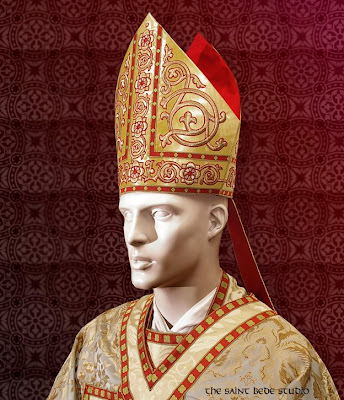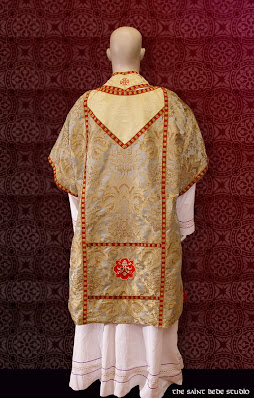In March of that year, the Saint Bede Studio was contacted by the Archdiocese of Sydney with a request to submit designs for sets of vestments for the Papal Mass in Saint Mary’s Cathedral, Sydney, which was to be held on Saturday, 19th July, as part of World Youth Day. A chasuble and stole, Pontifical dalmatic and mitre were to be prepared for the Pope’s use, in addition to three dalmatics for the deacons assisting the Pope at the Mass.
 |
| Design for the Papal Vestments |
Designs were prepared for vestments decorated in three different styles: the Gothic Revival; Carolingian; and according to the traditions of Rome. These designs were then submitted by the Archdiocese of Sydney to then Prefect of Pontifical Ceremonies, Monsignor Guido Marini, who selected the design for vestments ornamented in the Roman style. The adjacent image depicts the design chosen by the authorities in Sydney and Rome. At the time they were drawn up, Pope Benedict was still using the ferula of S. John Paul II and the form of primitive pallium imposed on him at the beginning of his Pontificate in 2005. He did not use either during his trip to Sydney.
In preparing the design, certain considerations were deemed important. First, that the vestments be beautiful and dignified, as is fitting for vestments used by the Pope. Second, that the vestments be convenient for the use. Lastly, that the vestments be visually related to Roman traditions for ornamenting sacred vestments.
 |
| S' Martin. |
The fabric for these vestments was a magnificent silk damask silver and gold in colour, which was figured with embroidery in the Italianate style of 18th century. The front of the chasuble is decorated with the “tau”: an ornament in continual use in Rome for almost 1000 years. The ornament of the chasuble, Pontifical dalmatic and dalmatics of the three deacons was in a straw-coloured silk damask, trimmed with a 2cm wide quatrefoil braid of red and gold, especially designed by the Saint Bede Studio. All the vestments were lined in crimson-red silk and bear the Papal coat of arms. An adjustment to the design occurred by way of enrichment. The tau at the front and column at the back had embroidered medallions added to them, to give the chasuble a more three-dimensional effect.
 |
| Mitre of S' Thomas. |
The mitre for Pope Benedict's use was made from cloth gold upon which was embroidered mediaeval scrollwork in gold, silver and crimson thread. These embroideries were derived from the historic mitre of Saint Thomas Becket (12th century) kept at the Sens Cathedral. The lappets of this mitre are also embroidered with scrollwork and bear the Papal coat of arms. The embroidery of the mitre was carried out in Australia.
Below are images of all the vestments taken in the course of their manufacture.
Below are images of all the vestments taken in the course of their manufacture.
 |
| Constructing the mitre. |
 |
| The completed mitre. |
 |
| Detail of the mitre lappet depicting the coat of arms of Benedict XVI. |
 |
| The Papal stole. |
 |
| The Papal tunicle. |
 |
| Sewing the Papal chasuble. |
 |
| Dalmatics for the deacons-assistant. |
It was a tremendous and unexpected privilege to make these vestments for the use of Pope Benedict. It was a project with its ups and downs but, protected by the Divine Hand, it was possible to bring it to a happy conclusion. There were also human agents whose generous assistance enabled this project to be completed in time for the Papal visit.
Ut in omnibus Deus glorificetur!
A concluding post will describe my experiences at Saint Mary's Cathedral Sydney during the Papal visit.


